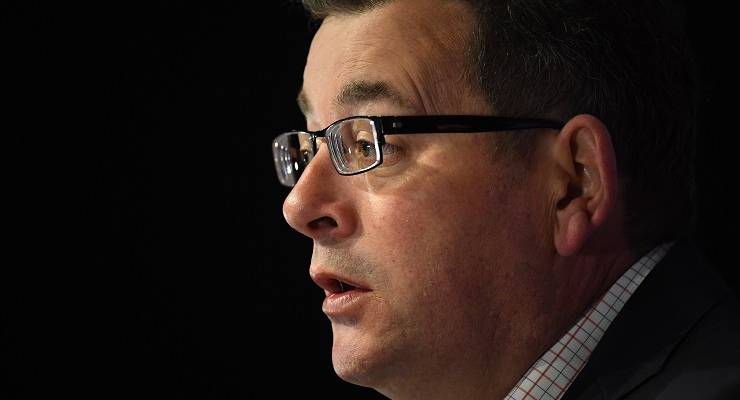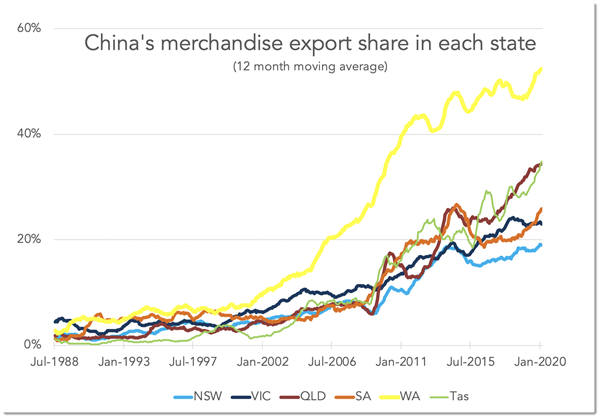
An agreement with China signed by Victorian Premier Dan Andrews in 2018 is suddenly at the centre of a blazing international controversy.
The pledge commits Victoria to join China’s Belt and Road Initiative — a global infrastructure plan that the federal government views with suspicion.
To judge by high-level comments, the US is apparently suddenly furious about it. US Secretary of State Mike Pompeo warned the US will “simply disconnect” with Australia if the deal impinges telecommunications security.
Although the US ambassador to Australia later walked back Pompeo’s comments — and perhaps they were, Trump-style, off-the-cuff and uninformed — the deal between Victoria and China suddenly looks questionable.
The pandemic has destabilised whatever equilibrium existed between China and the west, and China has dramatically elevated the level of aggression in its diplomacy. At this point, whoever is closest to China is tarred by association.
The furore raises many questions.
Should we trade with a country that doesn’t share our values? Or is trade a way to help prevent conflict with a nation that doesn’t share our values? Should states build their own relationships with foreign countries? Do states have sufficient access to intelligence to make these decisions wisely? Is it even constitutional for a state to sign a trade agreement with a foreign nation?
Australia’s relationship with China is rich and deep. But it is not shared equally between the states. Some depend on China far more in terms of goods exports, and some far more in services exports.
As the next graph shows, there is one state which rises above the rest in exporting goods to China. Western Australia’s huge iron ore deposits are being extracted in a rush to help China build infrastructure and homes for over a billion people.

Western Australia’s earnings from exporting to China dwarf those of the other states. WA is also the most China-dependent state, as the next graph shows. It is not only the absolute amount exported to China which is high, but also the proportion of WA’s exports that go to China.
While other states send between 19% and 34% of their goods exports to China, WA is over 50%.

The above graph also illustrates how recent China’s rise has been. Its export share in each state has roughly doubled in just the last decade. That is true even in NSW, which is the least dependent on China for its good exports.
So is NSW insulated from the currents of ill-will flowing between China and the west? Far from it.
NSW and Victoria are both huge services economies and it is via services trade that they depend on China. International education is a giant industry in both states, and in 2020 just under 30% of international students in those two states are from China.

The China-dependence of international education has been falling, however, as universities and other institutions try to diversify.
In the ACT the proportion of international enrolments coming from China has moderated from 59% in 2017 to 49% in 2020. In Victoria the share has fallen from 33% to 27% in the same period, and similar patterns are visible in the other states.
But while education is growing slightly less China-centric, travel is growing moreso.
China is now Australia’s second-biggest source of tourists, behind only New Zealand. And those tourists overwhelmingly come to NSW and Victoria.
So why has Victoria jumped into bed with China while WA — which sells far more to China in raw terms — remained cool?
The answer is the nature of these markets. Iron ore is a commodity. Commodities are extremely fungible. One can replace another.
If China changes the source of its ores or its coal, we can still sell our coal and ores into the global market, to meet the demand that now exists because someone else is selling to China. Commodity markets heal-over fast.
Markets in non-commoditised goods like education and travel are not like that. When your services sector depends on China, you’re more vulnerable.
So is Victoria Australia’s soft underbelly; the weak spot China can exploit? Perhaps. But it also gives us a much richer set of links to China.
Chinese people who’ve visited Victoria are far more likely to have a positive view of Australia than people who live in apartment towers made with West Australian iron.
And even though it is not a democracy, the Chinese government needs to pay attention to the will of its people.









I would be ready to duck after posting this article… so many lines to attack starting with.… “Should we trade with a country that doesn’t share our values?”…. What “values” are we talking about here? Perhaps the “have a go to get a go” BS our faux PM is continuing to trot out?? This current government would appear to share many of the “values” of the CPC!
Anyway ASSUMING you mean values along the line of democratic processes, rule of law, upholding human rights etc etc then we’d be doing precious little trade globally if we only traded with countries that also appear to share them!
I did however learn a new word today, fungible! So thank you for that even though I don’t think I’ll be trying it out in polite company, it sounds horrid!
What troubles me about entering into a preferential agreement with China, or any other country for that matter, is that once you do it, how are you going to tender for major projects? For example, if Chinese tenderers have a 40% or 50% advantage over other tenderers, are the other tenderers going to bother tendering? And the Chinese tenderer can load the price up 30% in the knowledge that it will still have a 10% or 20% margin of safety. It can load its tender up more if it knows there are no other tenderers. So the tendering government will end up paying significantly more for its projects.
Bolt made some good points last night about the similarities between the behaviour of the Xi regime and Nazi Germany in the 1930’s.
Whipping up extreme nationalist sentiment in the populace; regaining an ancient destiny for the Chinese people by forcefully taking its rightful place in the world; intimidating its neighbours over territory and influence which were historically claimed to be Chinese; a vast military buildup with the latest technologies; creating a ‘co-properity’ zone with Chinese finance around the world (belt and road) to debt trap small countries, infiltrate larger economies with supply chain dependency and buy stooges around the world. Dr Tedros is one amongst many.
Dan Andrews is by no means the most egregious Chinese stooge bought in Australia. We know that Sam Dastary only cost $1600; but there are ex-PM’s, ex-Trade Ministers, ex-Premiers, current Vice-Chancellors of G8 Universities all willing to suck on the Chinese teat and if not sing off the PRC songsheet, use their influence and power to shut up critics and expel young students who oppose the greatest challenge to the Western democracies since Hitler and Stalin.
If you believe a certified racist like Andrew Bolt….!
Don’t be like that AussieLouis, Bolt speaks well of you…….
If the issue is trading with countries which have social values & political systems at great variance with our own, may I suggest that we reconsider our dependence on the country with which we have had, for decades, the largest trade deficit and which has wrought more havoc, pain & destruction on the world than any other in history?
US of A?
So, how has our support for giving Tibet back to the Tibetans gone? Utter appeasement. Peace in Time revisited.
oops, sorry – should read ‘Peace in Our Time’